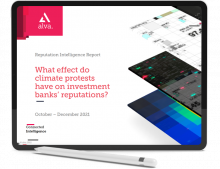How climate protests impact the reputation of investment banks
The world’s largest banks are popular targets for climate campaigners, who are forcefully voicing opposition to the financing of fossil fuels and other climate threatening activities, and their public protests have a powerful and potentially damaging effect on banks’ corporate reputation, as shown by alva’s latest reporting
Investment banks: a visible target
Energy firms have borne the brunt of popular protests in recent times, but lately the focus has been on rising fuel costs rather than climate impact. That issue is now being laid at the door of the major investment banks, which were the subject of demonstrations across the UK in the final quarter of 2021. Failures to disclose climate related targets, greenwashing, and the funding of fossil fuel projects brought condemnation from climate action groups.
JP Morgan and Barclays Bank were the most publicly vilified, while HSBC also weathered a march on its buildings. The impact of these activities, both on day-to-day operations and longer-term reputation was significant, and negative coverage was amplified by media focus during the COP26 climate summit in November.
On 2 November, Extinction Rebellion (XR) held the ‘Trillion Dollar Bash’ outside JP Morgan’s Glasgow HQ, calling out the bank’s £5.2bn investment in coal power since 2017. A 24-hour protest vigil followed days later. Barclays’ turn came in December, with an XR rally in Haverfordwest over the funding of fossil fuels and a protest at Ceredigion Council insisting the council stop doing business with the bank.
And anti-finance sector climate demonstrations are not limited to the UK. In the US and across Europe throughout 2020 and 2021, campaign network BlackRock’s Big Problem organised a series of events pressuring asset managers to climate-proof their investment policies.
Climate protests pack a reputational punch
The fallout for investment banks from popular protests is reputationally material. Research by alva which tracked stakeholder sentiment across 1,843 stories covering these events reveals a negative impact on the sector. In print and online media, blogs, social networks and financial and political analysis, the average stakeholder sentiment score for all banks during Q4 2021 was -29.9. The presence of Extinction Rebellion at a protest was enough to drop sentiment to -30.6. The Trillion Dollar Bash, meanwhile, increased the magnitude of negativity toward JP Morgan by 60%, hitting -48.9.
Calculated using alva’s proprietary AI system analysing content sources, stakeholder negative sentiment is a proxy for stakeholder opinion. The reputational impact of popular climate protest is clearly illustrated through the dips in sentiment towards investment banks during and immediately following these events. To manage future reputational risk from related activity, banks need the functionality to track the impact of their decisions related to the climate agenda.
Forewarning of reputation risks
Future trends look set to exacerbate these issues. Climate activists will not be appeased by surface-level greenwashing, or statements of intent. Transparent and assertive action on climate change will be an imperative for investment banks going forward, not just due to popular protest but also pressure from priority stakeholders – customers, regulators and employees.
On its current trajectory, global warming will overshoot the 1.5C increase above pre-industrial levels targeted at COP26. A study by Nature interviewing authors of the 2021 IPCC climate report’s found that 60% believe the Earth will reach 3C above the pre-industrial benchmark by 2100. Financial services meanwhile seem set on downplaying this risk, with a 2019 European Corporate Governance Institute survey reporting 60% of bankers think temperatures will increase less than 2C.
It’s understandable that lower climate risk predictions prevail in banking – integrating these risks into investment models is complicated, with best practice yet to be codified. The climate crisis is hard to price. It must, however, be done. The ECGI paper found ESG-focused investors favour risk management and engagement, rather than divestment, as the solution.
To make the necessary adjustments to manage climate risks and mitigate their financial and reputational implications, investment banks need a reliable means of calculating their ESG liability.
The power of Stakeholder Intelligence in mitigating reputation damage
Tracking specific topic markers, such as climate change, gives organisations oversight of reputational risk and the opportunity to get ahead of the issues and reshape their climate policy.
The measurable impact on stakeholder sentiment towards major banks following climate campaigns shows that localised activity can have wide-reaching impacts. A popular protest on the streets of Glasgow reported nationally across the UK in a negative vein will influence investor decisions and magnify the impact of the issue. Stakeholder Intelligence monitors even the smallest shifts in sentiment, allowing investment banks to defuse the causes before they coalesce into major reputational harm.
For an in-depth analysis of the effects of recent environmental campaigns on the investment banking sector, see alva’s latest Reputation Intelligence Report What effect do climate protests have on investment banks?
Be part of the
Stakeholder Intelligence community










